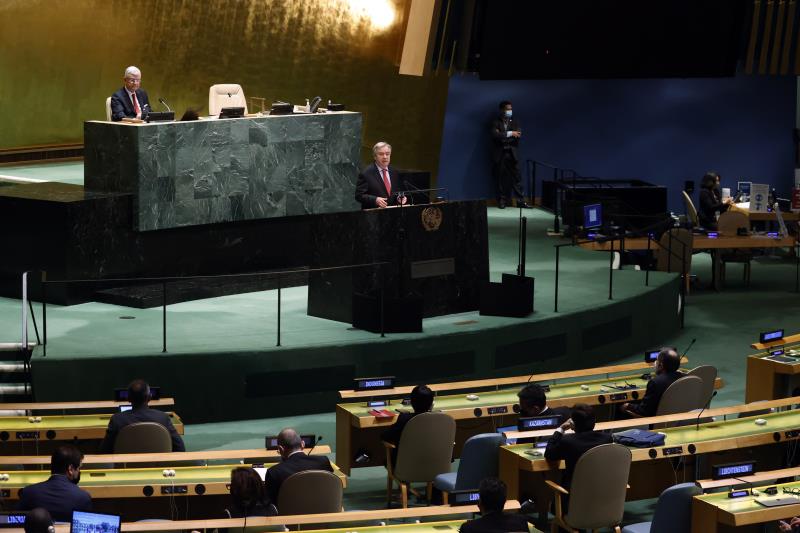RIO DE JANEIRO, BRAZIL – Cuba once again received on Wednesday overwhelming support from the international community in its denunciation of the US embargo, with the approval at the UN General Assembly of a resolution demanding the lifting of sanctions; the resolution was again opposed by the United States despite the change of government in Washington.
The resolution, which Havana has been promoting annually since 1992 and which is not binding, was approved with 184 votes in favor, two against (United States and Israel) and three abstentions (Colombia, Ukraine, and United Arab Emirates).

“Resounding victory! The cynical, lying, and slanderous imperial discourse is immoral, shameless, and obsolete as the criminal blockade. The world is with Cuba,” Cuban President Miguel Díaz-Canel celebrated through social networks immediately after the vote.
For yet another year, Washington was practically alone in its defense of the embargo, and only Israel, one of its most loyal allies, supported its position.
In 2019, the last time this appeal had been voted on since it was postponed last year due to the pandemic, the text had received the support of 187 of the 193 member states, but with one more “no” vote, that of Brazil, which on this occasion did not speak out.
BIDEN MAINTAINS THE “NO” VOTE
The vote on the resolution was the first with President Joe Biden at the head of the U.S. government, but this did not change Washington’s “no” vote.
In 2016, with Barack Obama’s administration, in which Biden was vice president, the US abstained for the first time, allowing the text to go ahead without opposition at a time of rapprochement with Havana.
After Donald Trump came to power, the U.S. returned to its traditional rejection of this resolution, which Biden has chosen to maintain for now.
Read also: Check out our extensive coverage on Cuba
The new US Administration has made it clear that resuming rapprochement with Cuba is not one of its priorities, even though it has pledged to review the measures imposed by the Trump Administration, especially that of including the island on the list of countries sponsoring terrorism.
Today, the U.S. delegation defended sanctions as a “legitimate tool” of foreign policy and stressed its support for the struggle for the “freedom” of Cubans.
SOLIDARITY WITH CUBA
Meanwhile, dozens of countries and regional groups took the floor to denounce the embargo and show their solidarity with Cuba.
The European Union (EU), whose members unanimously supported the resolution, underlined the damage the embargo causes to Cuba’s economic situation and its impact on Cubans’ well-being.
Powers such as China and Russia also criticized the U.S. sanctions policy and considered it counterproductive, while countries such as Venezuela and Nicaragua made the strongest arguments against Washington’s stance.
PRESSURE DURING THE PANDEMIC
The speech of Cuban Foreign Minister Bruno Rodriguez, who accused the United States of taking advantage of the Covid-19 pandemic to increase pressure on his country, was also heated.
“The United States government took on the virus as an ally in its ruthless unconventional war, deliberately and opportunistically tightened the economic, commercial and financial blockade; and caused the country record losses of around 5 billion dollars,” Rodriguez pointed out before the General Assembly.
In total, Havana claims that the embargo caused 9.157 billion dollars in losses to the country last year, by far the highest figure denounced so far by Cuban authorities since the sanctions were imposed almost six decades ago.
In recent months, the Cuban government has carried out an intense campaign to denounce the embargo, toughened by Trump with new sanctions during his recent four-year term.
In an attempt to stifle Cuba’s economy, the Trump administration established measures to hinder further Cuba’s economic transactions and the arrival of U.S. tourists and, in addition, included the Caribbean country on the list of sponsors of terrorism.
“All these measures are still in force today and in full practical application and, paradoxically, they are shaping the conduct of the current U.S. government, precisely in the months when Cuba has experienced the greatest increase in the number of infected people, the highest number of deaths and a higher economical effect of Covid-19,” denounced Rodriguez.
“Like the virus, the blockade suffocates and kills, and it must stop. Homeland or Death! We shall overcome!”, the head of Cuban diplomacy concluded his speech.
Meanwhile, in front of the UN headquarters, a group of Cuban opponents gathered to denounce the situation in the country and demand the release of political prisoners.
“Today’s message has been straightforward, of a very elementary justice, which is freedom for political prisoners”, explained the journalist and writer Carlos Manuel Alvarez, who stressed that the “illegal and unjust policy” of the embargo could not justify that “people in Cuba serve prison time for expressing themselves.”

